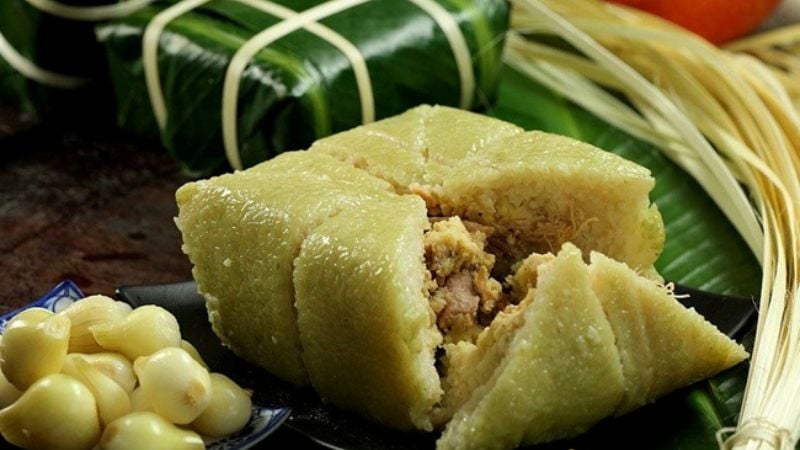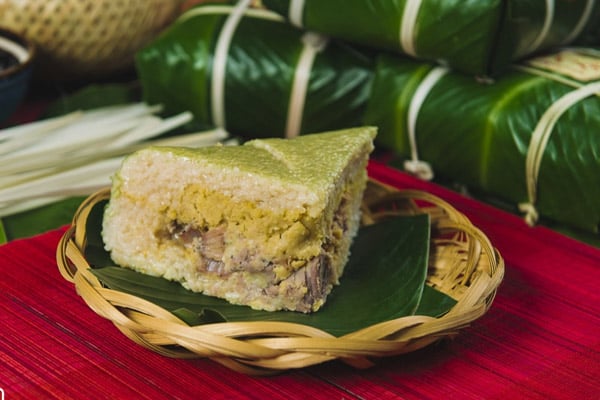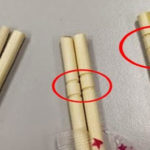According to the Food Safety Bureau (Ministry of Health), in terms of nutrition, sticky rice cakes are a well-rounded food. Since ancient times, our people have known how to scientifically combine different ingredients to create this flavorful traditional dish. Sticky rice cakes contain a balanced combination of proteins, carbohydrates, fats, vitamins, and minerals in appropriate proportions. On average, a sticky rice cake wrapped for the Lunar New Year includes 500g of glutinous rice, 100g of mung beans, 100g of fatty pork, and around 5g of fresh shallots.
The nutritional composition of this sticky rice cake is as follows: 79.55g of protein, 47.20g of fat, 427.84g of carbohydrates, 7.13g of minerals (including 0.233g of calcium, 1.025g of phosphorus, 0.016g of iron, etc.), 0.081mg of vitamin A, 1.68mg of vitamin B1, 0.43mg of vitamin B2, 13.21mg of vitamin PP… providing the body with 2,620 Kcal. Therefore, consuming just one sticky rice cake a day is sufficient for an average worker’s daily nutritional needs, ensuring a well-balanced diet.

In terms of hygiene, sticky rice cakes meet the highest sanitation standards as they are wrapped in clean dong leaves and thoroughly cooked for several hours. They are both nutritious and clean, tasty, easily digestible, and safe to eat. However, these statements only apply to freshly-made sticky rice cakes during the Lunar New Year days. In reality, many families make sticky rice cakes a few weeks before the holiday and may encounter issues such as moldy or rancid cakes, which can be dangerous to consume.
Who should avoid eating sticky rice cakes during the Lunar New Year?
People with stomach problems
Sticky rice cakes contain glutinous rice and mung beans, both of which can cause bloating, acid reflux, and indigestion.
Therefore, individuals with a history of stomach issues should avoid consuming this type of cake, as it may worsen their condition.
According to experts, when eating sticky rice cakes, it is recommended to consume them with vegetables and fruits to avoid gastrointestinal discomfort.
People with cardiovascular diseases
As mentioned earlier, sticky rice cakes are rich in nutrients and a great source of energy, containing over 200kcal/100g. These cakes provide a combination of plant-based and animal-based proteins and fats.
Therefore, individuals with a history of cardiovascular diseases should avoid consuming sticky rice cakes, as it can lead to an accumulation of fats in the body, negatively affecting heart health.
People who are obese
Due to their high fat and nutrient content, sticky rice cakes are not suitable for everyone, especially individuals who are obese.
According to experts, those who are overweight or obese should limit their consumption of sticky rice cakes to maintain their health and prevent further weight gain.
People with acne-prone skin
Sticky rice cakes are mainly made from glutinous rice, which has a warming effect. As a result, individuals prone to acne or skin irritations should be cautious when consuming this type of cake.
People with high blood pressure
In traditional sticky rice cakes, the outer layer, called “vo,” is made from glutinous rice, while the filling is made from mung beans and fatty pork.
Therefore, individuals with high blood pressure should avoid consuming these fatty-rich cakes, as it can increase gastric acid production and negatively affect their health.

People with diabetes
Sticky rice cakes are packed with energy and contain a significant amount of carbohydrates, proteins, fats, vitamins, and minerals. For individuals with diabetes, it is advisable not to consume excessive amounts of sticky rice cakes, as it can lead to high blood sugar levels and affect their overall health.
Moreover, individuals with chronic illnesses, such as high cholesterol or diabetes, should avoid sticky rice cakes. For example, individuals with high cholesterol levels should avoid consuming salty sticky rice cakes, while individuals with diabetes should avoid sweet sticky rice cakes. Additionally, those with poor digestive function should refrain from consuming cold sticky rice cakes.
People with kidney problems
Due to the high energy and fat content, sticky rice cakes are not recommended for patients with kidney problems, as they can lead to dyslipidemia, increased fat accumulation, and various kidney-related complications.
Furthermore, sticky rice cakes are also considered one of the high-salt foods, which can negatively impact individuals with kidney issues.
8 Common Mistakes People Make with Cutting Boards
Are you using your cutting board correctly? Many Vietnamese households rely on cutting boards in their kitchen, but not everyone knows how to use them properly, especially when it comes to wooden cutting boards. Check out these 8 mistakes to avoid when using a cutting board to ensure both hygiene and safety for everyone in your family.
Is Refrigerated Leftovers Linked to an Increased Risk of Cancer?
Dr. Lam Van Man, Head of Research, Development and Technology Transfer Department of the Institute of Safety Food, has warned of the risk of food poisoning when reheating leftovers from the refrigerator. But what should we be aware of when it comes to the possibility of these leftovers causing cancer? Here, we explore what the experts have to say on the matter and offer some tips for safe eating.





































